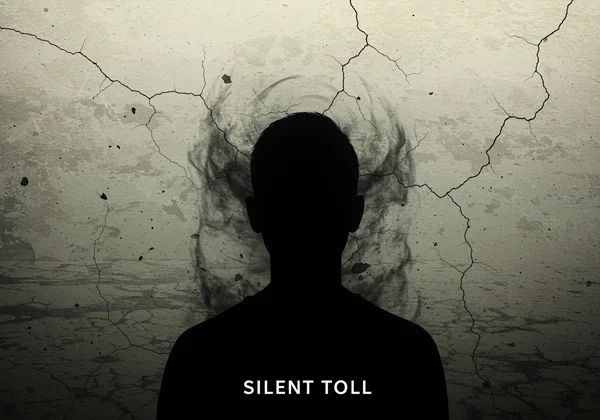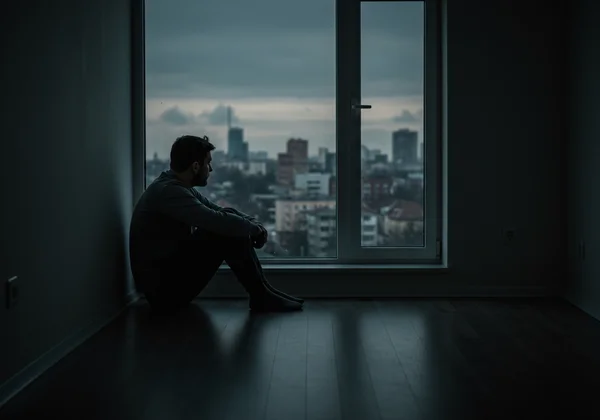未經治療的間歇性暴怒症:隱藏的影響
September 7, 2025 | By Sophia Galloway
在一次爆發性的情緒失控後,沉默往往會加劇羞恥、後悔和困惑的感受。許多人將這些強烈的發作視為「脾氣暴躁」或「易怒」,但如果它不只如此呢?未經管理的憤怒所帶來的無聲的損耗,會在你生活的各個層面留下深刻、看不見的傷痕。了解 未經治療的間歇性暴怒症 的後果至關重要。你是否正在經歷其隱藏的代價?
頻繁且無法控制的憤怒並非個性上的怪癖;它可能是某種可治療病症的徵兆。忽視這些模式會讓損害隨著時間累積,影響你的福祉、人際關係,甚至你的身體健康。認識到需要釐清是打破這個循環的勇敢第一步。如果你正在質疑自己的憤怒模式,可以透過一份旨在幫助你了解自身經歷的保密評估,獲得初步見解。

了解未經治療的間歇性暴怒症:不只是脾氣差
了解一般挫折與指向 間歇性暴怒症 (IED) 的特定模式之間的區別非常重要。未經治療的間歇性暴怒症並非偶爾的易怒;它是一種以反覆行為爆發為特徵的疾病,顯示出無法控制攻擊性衝動。其主要特徵是攻擊性與觸發事件極度不成比例。這些並非經過算計的行為,而是衝動的、往往令人恐懼的失控。
定義慢性爆發性憤怒:其真正含義
其核心在於,慢性爆發性憤怒 是一個破壞性的循環。它通常始於緊張或激動的累積,隨後是爆發性的情緒失控,帶來短暫的釋放感。然而,這種解脫感很快被深深的後悔、羞恥或尷尬所取代。這種衝動與懊悔的模式定義了許多人的經歷。
這不是適當的憤怒;這是不成比例的暴怒。一點小小的煩惱,例如打翻飲料或有人在交通中插隊,都可能引發令他人震驚的極端反應。了解這一點是尋求幫助的第一步。對於臨床定義,美國精神醫學會在其《精神疾病診斷與統計手冊第五版》(DSM-5) 中提供了官方診斷標準。
為何間歇性暴怒症常未被診斷:尋求幫助的障礙
儘管其影響深遠,間歇性暴怒症卻常未被識別。尋求幫助的最大障礙 之一是社會污名。憤怒常被視為性格缺陷,而非精神健康狀況的症狀。人們可能因無法控制脾氣而感到深深的羞恥,導致他們隱藏自己的困境。
此外,社會有時會將爆發性行為正常化,使個人無法將其視為需要幫助的問題。對於被評判的恐懼,加上對間歇性暴怒症等疾病存在的缺乏認識,為診斷和治療製造了強大的障礙。進行免費且私密的憤怒自我評估 可以是繞過這些障礙並獲得清晰認識的安全方式。

未經治療的間歇性暴怒症所帶來的毀滅性長期影響
當間歇性暴怒症未被處理時,其後果會向外擴散。情緒失控造成的直接傷害往往只是冰山一角。未經治療的間歇性暴怒症的累積性 長期影響 更具腐蝕性,在數年間悄然侵蝕著一個人的生活品質。忽視間歇性暴怒症的跡象,就像忽視地基的裂縫;最終,整個結構都會變得不穩定。
侵蝕個人福祉:心理健康與自尊
患有未經治療的間歇性暴怒症對你的內心世界來說是沉重的負擔。憤怒與後悔的持續循環會嚴重損害 心理健康與自尊。每一次情緒失控都會強化負面的自我形象,導致「失控」或「一個壞人」的感覺。這可能導致陷入抑鬱、焦慮和社交孤立的惡性循環。
你可能會開始活在對自己脾氣的持續恐懼中,避免可能觸發情緒的場合。這種迴避限制了生活體驗,並可能導致深刻的孤獨感。內心的獨白充滿嚴厲的自我批評,使得維持健康的自我價值變得異常困難。

職業與學業挫折:對事業和教育的影響
在專業或學術環境中,情緒調節是成功的關鍵。間歇性暴怒症的衝動性爆發可能導致嚴重的 職業和學業阻礙。對同事、老闆或教授的爆發性反應可能導致紀律處分、聲譽受損,甚至被解僱或開除學籍。
隨著時間的推移,這可能造成工作不穩定和潛力未能發揮的模式。你可能難以在團隊中協作、接受建設性批評或應對高壓環境。爆發性憤怒的後果可能關閉事業發展的大門,造成巨大的經濟和個人壓力。如果你覺得自己的憤怒正在影響你的工作,可能是時候 開始你的評估 了。
漣漪效應:未經治療的間歇性暴怒症對人際關係的影響
或許未經治療的間歇性暴怒症最痛苦的後果,就是它對人際關係造成的損害。最親近你的人往往承受著情緒上的傷害。間歇性暴怒症對人際關係的影響 深遠,創造了恐懼、不穩定和情緒耗竭的環境。
信任是任何健康關係的基石,而爆發性憤怒會將其粉碎。親人可能會開始「如履薄冰」,小心翼翼地監控他們的言行,以避免引發情緒失控。在家庭中,未經治療的間歇性暴怒症會造成深刻而持久的創傷。目睹父母爆發性憤怒的孩子可能會產生焦慮,而配偶和伴侶則可能感到不安全和不被愛。友誼也會受損,因為人們會疏遠,不願忍受這種不可預測性。這種社交孤立只會加劇羞恥和孤獨感,進一步助長疾病的循環。

持續性爆發性憤怒的無形健康風險
未經治療的間歇性暴怒症不僅影響你的心智和人際關係;它也對你的身體健康造成重大損害。與 持續性爆發性憤怒 相關的慢性壓力和高度情緒興奮狀態可能是危險的。當你的身體反覆被腎上腺素和皮質醇等壓力荷爾蒙淹沒時,會導致多個器官系統的磨損。
超越憤怒:心理健康併發症與共病現象
未經治療的間歇性暴怒症很少單獨存在。它與 其他精神健康狀況 存在高度的共病率。它所造成的痛苦可能導致或加劇重度抑鬱症、焦慮症和物質使用障礙等疾病,因為人們可能會藉助酒精或藥物來自我治療。美國國家心理健康研究所提供了關於這些疾病如何重疊的詳細資訊。這種複雜的相互作用使得全面的治療方法對於持久的福祉至關重要。
身體的代價:壓力相關疾病與慢性病
反覆、強烈憤怒的生理影響是嚴重的。研究一直將慢性憤怒與一系列 壓力相關疾病 聯繫起來。來自美國心臟協會等來源的研究表明,短暫的憤怒發作會損害血管功能,增加心血管問題的風險,例如高血壓、心臟病發作和中風。其他後果可能包括慢性頭痛、消化問題和免疫系統減弱。未經治療的間歇性暴怒症身體上的代價,凸顯了尋求幫助的迫切性。認識到這些跡象是 探索你的症狀 的關鍵原因。
打破循環:康復之路
未經治療的間歇性暴怒症的隱藏影響是巨大的,但最重要的訊息是希望:這個循環可以被打破。了解你的憤怒並非軟弱的表現;它是一種深刻的力量的展現。你不必永遠活在爆發性憤怒的陰影之下。有效的 間歇性暴怒症治療,包括認知行為療法 (CBT) 等治療方法,有時也包括藥物治療,可以幫助你重新獲得控制。美國心理學會提供了關於經證實的憤怒管理策略的優質資源。
旅程始於一步。如果你今天所讀的內容與你產生共鳴,我們鼓勵你參加我們免費、保密的線上評估。這是一個旨在提供個人化見解的工具。今天就 獲得保密見解,開始你的康復之路。
關於未經治療的間歇性暴怒症,你的問題已解答
如果不治療,間歇性暴怒症會隨著年齡增長而惡化嗎?
雖然情緒失控的頻率在中年時期有時可能會減少,但未經治療的間歇性暴怒症的 * 後果 * 幾乎總是會隨著時間的推移而惡化。對人際關係、職業機會和身體健康(如心血管問題)的長期累積的損害會不斷增加,使該疾病的整體影響隨著年齡增長而變得更加嚴重。
間歇性暴怒症可以治癒嗎?
雖然「治癒」可能不是最恰當的說法,但間歇性暴怒症是一種治療效果良好的疾病。透過認知行為療法 (CBT) 等治療,你可以學習辨識觸發因素、管理憤怒並發展更健康的應對策略。在某些情況下,藥物治療也可能有所幫助。治療的目標是有效管理症狀,讓你能夠過上穩定而充實的生活。
我如何知道自己是否患有間歇性暴怒症?
間歇性暴怒症的主要症狀 包括反覆的攻擊性爆發,這些爆發與觸發因素嚴重不成比例,並非預謀,且在你的生活中造成顯著的痛苦或損害。然而,只有合格的精神健康專業人員才能提供正式診斷。如果你懷疑自己可能患有間歇性暴怒症,使用保密的線上工具是一個有用的第一步。我們邀請你 嘗試我們的免費間歇性暴怒症測試,以獲得初步見解,並與醫生或治療師分享。
患有間歇性暴怒症是什麼感覺?
許多間歇性暴怒症患者描述在情緒爆發前,會經歷一種強烈且壓倒性的緊張感累積。在發作期間,他們通常會感到一種失控感。雖然事後可能會有一種短暫的解脫感,但很快就會被強烈的尷尬、內疚和對自己言行的深深後悔所取代。